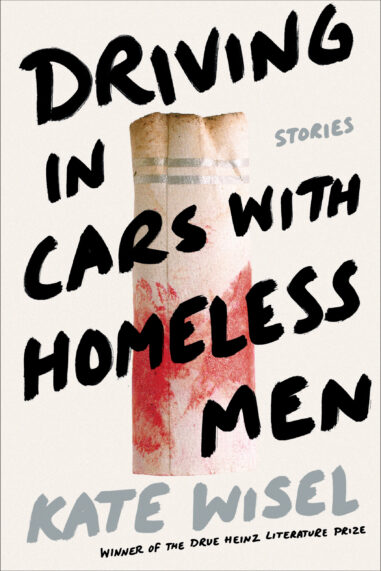Driving in Cars with Homeless Men
Stories
Wisel’s prose is strobelike, illuminating the gritty landscape with small, powerful details. . . This dynamic—and often harrowing—collection beautifully spotlights lives that are rough around the edges; not standard fare but highly recommended.
Winner of the Drue Heinz Literature Prize
A Library Journal Best Book of 2019
Finalist, 2019 Foreword Indies Award
Request Exam or Desk Copy. Request Review Copy
A Library Journal Best Book of 2019
Driving in Cars with Homeless Men is a love letter to women moving through violence. These linked stories are set in the streets and the bars, the old homes, the tiny apartments, and the landscape of a working-class Boston. Serena, Frankie, Raffa, and Nat collide and break apart like pool balls to come back together in an imagined post-divorce future. Through the gritty, unraveling truths of their lives, they find themselves in the bed of an overdosed lover, through the panting tongue of a rescue dog who is equally as dislanguaged as his owner, in the studio apartment of a compulsive liar, sitting backward but going forward in the galley of an airplane, in relationships that are at once playgrounds and cages. Homeless Men is the collective story of women whose lives careen back into the past, to the places where pain lurks and haunts. With riotous energy and rage, they run towards the future in the hopes of untangling themselves from failure to succeed and fail again.
More Praise
It’s GIRLS without all the privilege and a fictionalized version of Lisa Taddeo’s Three Women (2019), if the three women were friends. Bringing to life some of the smaller situations that have colored the #MeToo movement, this is fierce and emphatic.
You can hear the crackle of heat and the roar of a powerful fire burning through these pages. Young angry women, brokenhearted mothers, and men who are lost to themselves and others struggle in the world of Driving in Cars with Homeless Men. Close to the edge, fearful of love yet dying of longing, Serena, Frankie, Raffa, and Natalya are vital and tender. Their stories are incandescent.
To call a short story collection ‘gritty’ — as in having strong qualities of tough uncompromising realism — is a bit commonplace, but Kate Wisel’s debut, “Driving in Cars With Homeless Men,” is gritty in the best sense. These 20 linked short stories — some of them very short — offer up hard granules of truth about contemporary women contending with dispossession, oppression and violence. By focusing on the lives and friendships of four main characters living in working-class Boston, as Wisel depicts the overlapping struggles of Serena, Frankie, Raffa and Natalya, so too does she reveal bigger realities about substance abuse, family, anger and hope. . . . With a knowing and experienced eye, Wisel describes the down-and-out milieus of her protagonists in wry but never condescending detail.
Wisel’s characters possess a steely wisdom, the kind of smarts born out of bad nights and big hurts, a kind of knowing forged in pain and aimed, ultimately, toward generosity, humor, and love. Wisel writes with a poet’s attention to cadence and precision of description: 'The Citgo sign sinks, then disappears completely as we go down through the snake-cage flicker of the underpass.' The city, and its people, live, breathe, and flame on the page.
Unflinching in its portrayal of the violence visited upon her protagonists, Ms. Wisel’s stories move back and forth in time to examine the difficulty of transcending one’s history, while reminding readers that the work of becoming one’s best self can only be achieved with love and support — not just from others, but from oneself.
Quietly powerful and timely, Driving in Cars with Homeless Men is both an ode to and a call to action for all affected by relational violence.
“Kate Wisel’s women think like razor blades. They talk tough and love tougher, except how they love each other which is pure and deep, and ought to be enough, except it isn’t, ever. These women vibrate with life, with longing, with an urge toward self-annihilation, with hope. Their hope will break your heart the hardest. Along with the sentences, which seem to be written by angels, razor-blade toting angels. This is one architecturally stunning, linguistically dazzling, hyper-intelligent, heart-expanding debut.”
“Kate Wisel is a fearless writer—with literary guts and a distinctive nitro style--and Driving in Cars with Homeless Men is a remarkable debut. The gritty lyricism of her voice makes me think of punk rock and blown mufflers and creaky bedsprings flavored with cigarette ash, red bull-and-vodka, gum stuck to the bottom of a Doc Marten, a little bit of Denis Johnson mixed up with a Janis Joplin howl. Welcome her. I can't wait to see what she does next.”
In this devastating collection, Wisel's people move through hallucinogenically dangerous landscapes, both physical and emotional, alternately finding and destroying themselves in pursuit of pleasures that are nearly indistinguishable from pain. But running through these breathless tragi-comic iterations of consumption--of drugs, booze, of love, of sex--is a deep vein of compassion, illuminating the dark, and deeply familiar, lives of these hungry Bostonians. A gritty, glittering, chemical delight told in scalpel-sharp prose, this is an astonishing debut from a fearless visionary with guts to spare.
192 Pages, 5.5 x 8.5 in.
August, 2020
isbn : 9780822966272
Series
about the author

Kate Wisel is a native of Boston. Her fiction has appeared in publications that include Gulf Coast, Tin House online, New Delta Review, The Best Small Fictions 2019, Redivider (as winner of the Beacon Street Prize), and elsewhere. She was a Carol Houck fiction fellow at the University of Wisconsin-Madison and awarded scholarships at Writing x Writers, the Wesleyan Writer’s Conference, the Squaw Valley Writer’s Workshop, and elsewhere. She lives in Chicago.
learn more

